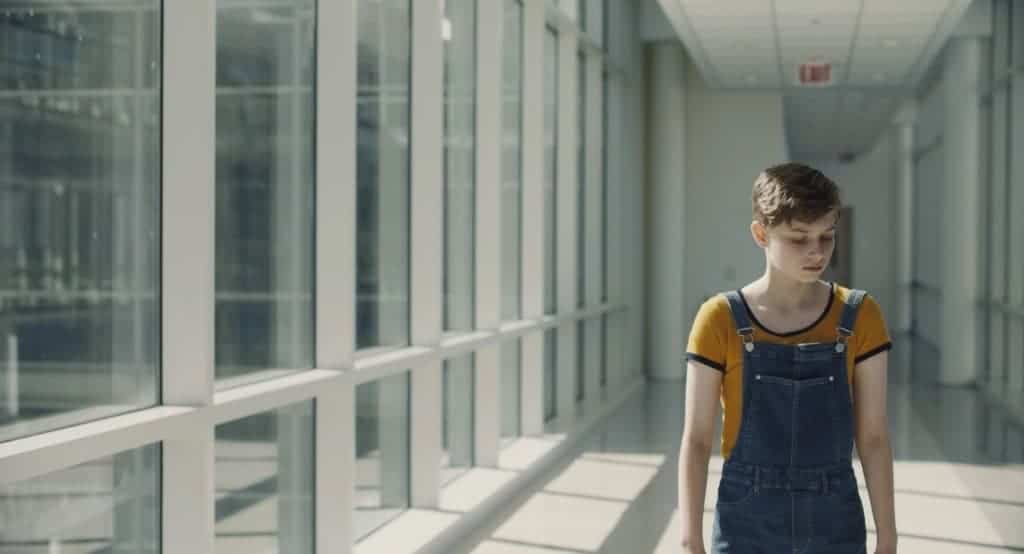‘They’ tells the story of a fourteen-year-old’s exploration of their gender identity.
With her timely debut feature, They, Anahita Ghazvinizadeh delivers a film that is, at times, interesting and aesthetically pleasing, but not quite captivating. Relying heavily on metaphor to tell the story of J (Rhys Fehrenbacher), a fourteen-year-old who goes by the pronoun “they,” and is contemplating whether to transition, They is an incoherent film, one that interests the viewer visually until the disjointed narrative becomes too much to bear.
The best parts of the eighty-minute film concern J’s exploration of their gender identity. The film begins with J at the doctor’s office, where we learn that J is using a hormone blocker to postpone puberty and, per the advice of their doctor, must give serious thought as to whether they will transition. After J meets with their doctor, they return home where their sister, Lauren (Nicole Coffineau), and her Iranian boyfriend, Araz (Koohyar Hosseini), are taking caring of them while their parents are away.
The film’s central conflict is not whether J will be accepted should they decide to transition — their family members are supportive, but whether it is the right decision for J. It is their personal journey that we play witness to, and it is in these moments that the film succeeds. Fehrenbacher’s performance is the sole highlight of the film. Fehrenbacher delivers a compelling performance, capturing the nuances and difficulty of J’s contemplation subtly in each facial expression. At seventeen years old, Fehrenbacher is a performer to watch.
Yet, the performance is accompanied by overdone visuals that do their best to distract the viewer. The film is full of flowers and other greenery, reminding us that they, like J, are growing and blossoming into who they truly are. This metaphor is aesthetically pleasing but, by the film’s midpoint, once we have understood and seen it countless times, grows tired.
Perhaps the film’s best moment comes when J and Lauren walk through the green wood near their home and discuss J’s life and difficulties coming to terms with who they are. Surrounded by budding flowers, J updates their sister, who has been away from home working as an artist, on their life. They tell her about the difficulties they have been having in school, and about the time they woke up and wrote down who they were each day.
“I can just write B, G, blank —if I don’t know, blank, blank. And then you count them at the end of the month” J says. It is a powerful moment, accentuated by the fact that it is the first time we hear J speak aloud at length.
But, just as we are drawn into J’s story, the film’s story shifts. What follows is a thirty-minute interlude during which we are told Araz’s (Lauren’s boyfriend) story. We are brought to a dinner party hosted by members of his family. This is where the story gets confusing. Araz tells them that he is considering traveling back to Iran to seek dental care. He cannot afford the cost of care in the United States, especially since he is saving up money for when his parents travel from Iran to the United States. Clearly, Araz’s story is constructed to mirror J’s; he is in a kind of limbo, stuck in between the cultures of Iran and the United States and feels forced to choose, just as J wakes up every day and wonders who they are.
This analogy, I suppose, could make sense, but, on screen, does not work. It feels forced and like a distraction from J’s story, which is the one we have followed up to this point. There is no real development or time given to Araz’s character up until this point, thus leaving us confused and wishing we were back with J. One gets the sense that these two stories were drafted separately and thrown together. In the film’s remaining twenty minutes, we return to J’s story, as if the last thirty minutes did not happen. And it is here where the film, as I said, feels disjointed.
I would like to end this review with an important qualifier and reminder: this is director Anahita Ghazvinizadeh’s first feature film. And in that way, it is an achievement, full of interesting shots and a few sequences that have remained in my mind since watching the film. I look forward to watching what comes next.

